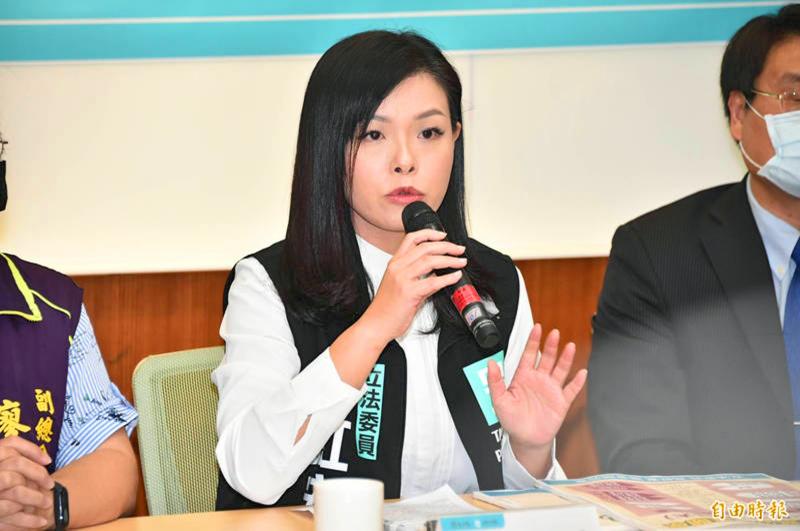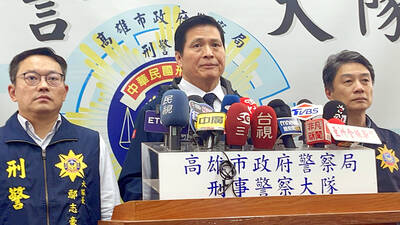Sixty-two percent of Taiwanese disapprove of the Central Epidemic Command Center’s (CECC) progress in obtaining COVID-19 vaccines, while 65.6 percent said that they would not take domestic vaccines that lack WHO certification, a poll released yesterday by Trend Survey and Research and commissioned by the Taiwan People’s Party (TPP) found.
Trend Survey general manager Wu Shih-chang (吳世昌) announced the results of the survey with TPP officials at a virtual news conference, adding that 41.3 percent of respondents said that they highly disapproved of the center’s efforts to secure vaccines.
About 68.6 percent of the respondents agreed that the country should rely on internationally approved vaccines, including 47.3 percent of Democratic Progressive Party (DPP) voters, 86.7 percent of Chinese Nationalist Party (KMT) voters, 92.6 percent of TPP voters and 68.7 percent of independents, he said.

Photo: Wu Chia-ying, Taipei Times
Just 28.1 percent of respondents said that they were willing to take a domestic vaccine not approved by the WHO, the European Medicines Agency or the US Food and Drug Administration.
Of the 65.6 percent of respondents who were unwilling to take a vaccine not approved by an international body, 36.7 percent said they would be highly unwilling to do so, Wu said.
About 52.8 percent of DPP voters and 48.6 percent of Taiwan Statebuilding Party voters said that they were willing to receive a Taiwanese vaccine, while less than 30 percent of voters from all other parties said that they would.
The poll was conducted from Saturday to Monday through telephone surveys, and collected 1,068 valid samples from people aged 22 and older.
Separately, TPP Legislator Ann Kao (高虹安) earned praise on social media after she on Tuesday questioned Minister of Health and Welfare Chen Shih-chung (陳時中) and Premier Su Tseng-chang (蘇貞昌) on the floor of the legislature over the government’s handling of domestic vaccines.
The Centers for Disease Control on May 28 preordered 10 million vaccine doses from local developers even when budget and trial results were not yet confirmed, said Kao, a former vice president of Hon Hai Technology Group’s Industrial Big Data Office.
On the same day, Deputy Minister of Health and Welfare Hsueh Jui-yuan (薛瑞元) told lawmakers that the vaccines budget approved last year had been used up buying foreign-made vaccines, Kao said.
Lawmakers did not amend the laws that would enable the government to raise the limit on that budget to NT$840 billion (US$30.32 billion) until three days later, and they are not expected to vote on the additional funding before Friday next week, she said.
“Where did the budget for the May 28 order of 10 million doses of domestic vaccines come from?” she asked. “Who authorized it and according to what law?”
The government had secured Taiwan’s right to priority access to the vaccines as a precondition for research subsidies, she said before adding: “Why the rush when there are no other buyers for the supply?”
Taiwan-based vaccine makers were not expected to “unblind” clinical trials before the middle of this month, which makes the government’s decision to sign the contracts for the vaccines puzzling, she said.
“Why does the government not wait half a month for the trial to ‘unblind’?” she said.
Su did not directly respond to Kao’s questions, while Chen replied that the process was hastened to ensure manufacturers would be prepared to produce the vaccine doses.

Twenty-four Republican members of the US House of Representatives yesterday introduced a concurrent resolution calling on the US government to abolish the “one China” policy and restore formal diplomatic relations with Taiwan. Led by US representatives Tom Tiffany and Scott Perry, the resolution calls for not only re-establishing formal relations, but also urges the US Trade Representative to negotiate a free-trade agreement (FTA) with Taiwan and for US officials to advocate for Taiwan’s full membership in the UN and other international organizations. In a news release announcing the resolution, Tiffany, who represents a Wisconsin district, called the “one China” policy “outdated, counterproductive

Actress Barbie Hsu (徐熙媛) has “returned home” to Taiwan, and there are no plans to hold a funeral for the TV star who died in Japan from influenza- induced pneumonia, her family said in a statement Wednesday night. The statement was released after local media outlets reported that Barbie Hsu’s ashes were brought back Taiwan on board a private jet, which arrived at Taipei Songshan Airport around 3 p.m. on Wednesday. To the reporters waiting at the airport, the statement issued by the family read “(we) appreciate friends working in the media for waiting in the cold weather.” “She has safely returned home.

ON PAROLE: The 73-year-old suspect has a criminal record of rape committed when he was serving in the military, as well as robbery and theft, police said The Kaohsiung District Court yesterday approved the detention of a 73-year-old man for allegedly murdering three women. The suspect, surnamed Chang (張), was arrested on Wednesday evening in connection with the death of a 71-year-old woman surnamed Chao (趙). The Kaohsiung City Police Department yesterday also unveiled the identities of two other possible victims in the serial killing case, a 75-year-old woman surnamed Huang (黃), the suspect’s sister-in-law, and a 75-year-old woman surnamed Chang (張), who is not related to the suspect. The case came to light when Chao disappeared after taking the suspect back to his residence on Sunday. Police, upon reviewing CCTV

TRUMP ERA: The change has sparked speculation on whether it was related to the new US president’s plan to dismiss more than 1,000 Joe Biden-era appointees The US government has declined to comment on a post that indicated the departure of Laura Rosenberger as chair of the American Institute in Taiwan (AIT). Neither the US Department of State nor the AIT has responded to the Central News Agency’s questions on the matter, after Rosenberger was listed as a former chair on the AIT’s official Web site, with her tenure marked as 2023 to this year. US officials have said previously that they usually do not comment on personnel changes within the government. Rosenberger was appointed head of the AIT in 2023, during the administration of former US president Joe